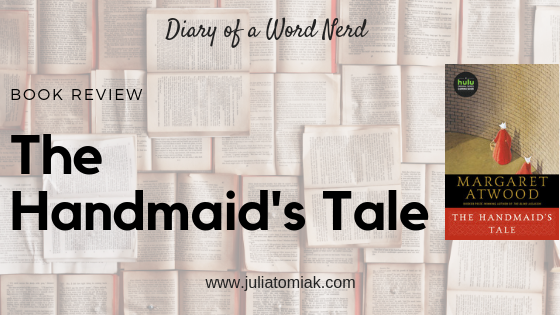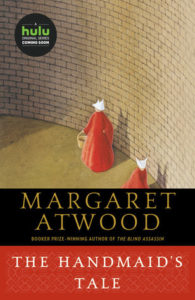Although it was written in the mid 1980’s, The Handmaid’s Tale is incredibly relevant for our time. Ever since the Hulu series started, I’ve been wanting to read the novel; it felt like a “necessary classic” for my reading repertoire. I finally listened to the audio version, excellently narrated by Claire Danes, and oh my goodness, the quality of Margaret Atwood’s writing and the intelligence of her observations inspires some serious thinking. In The Handmaid’s Tale, Atwood creates a dystopian world that is disturbingly plausible.
Premise
The Handmaid’s Tale is set in a post modern time in the Republic of Gilead. The government has been overthrown and a conservative religious sect has established a new social order based on fear. Women are no longer allowed to read, work, or have money; they are only valued for their ability to reproduce. Because of rampant infertility caused by toxic waste, fertile young women are abducted and sent to training centers to prepare for their new role as surrogate mothers for powerful families. Their identities are destroyed, and they must wear white head coverings that hide their faces.
What I liked
Atwood’s story is intense not just because of its content and themes, but also because of its vivid descriptions. Through the narration of the protagonist Offred, Atwood’s fictional world feels disturbingly real. (We never learn “Offred’s real name. The authorities have changed her identity based on the name of the man she has been assigned to. Atwood also suggests “Offred” could be perceived as “offered”, like an offering or sacrifice for religious purposes.) Here is how Offred describes how she feels in this strange new social structure:
“I am like a room where things once happened and now nothing does, except the pollen of the weeds that grow up outside the window, blowing in as dust across the floor.”
Also, Offred describes a “salvaging” – a public execution, cleverly dubbed “particicution” by the authorities, to make all of the observers feel involved:
“The three bodies hang there, even with the white sacks over their heads looking curiously stretched, like chickens strung up by the necks in a meatshop window; like birds with their wings clipped, like flightless birds, wrecked angels.”
Atwood uses her exemplary writing skill to explore important themes, most prominently the role of women in society. In the Republic of Gilead, sensuality is stifled in reaction to “the old ways”, when promiscuity and pornography prevailed. The “Aunts”, older women armed with electrified cattle prods to train the handmaids, tell Offred and the other women that the past was a time of “freedom to” whereas the present is a time of “freedom from”. Women no longer have to fear sexual assault, but they also have no independence.
The great power of The Handmaid’s Tale is the eerie familiarity of its plot. Offred describes the gradual take over of the country. There wasn’t paper money anymore; all transactions were computer based. Offred thinks that made the takeover easier. The tyrants seizing power blamed the coup on Islamic fanatics, and then they suspended the Constitution. She says, “Newspapers were censored and some were closed down, for security reasons they said. The roadblocks began to appear, and Identipasses. Everyone approved of that, since it was obvious you couldn’t be too careful.” All of these conditions sound much too much like actual events from our headlines.
My alarm increased while listening to Atwood’s afterward, which she composed sometime after the 2016 election. Atwood explains that she set out rules for herself when sitting down to write The Handmaid’s Tale. She would not put anything in the book that hadn’t already occurred in what “James Joyce called ‘the nightmare of history’”. She drew upon historic events (slavery, polygamy, child abductions by Argentinian generals, the actions for Hitler’s SS squad) and her experiences traveling behind the Iron Curtain to create her story. So, not only could these things happen, in some places in the world, they already have.
Atwood says, “Anything can happen anywhere, depending on the circumstances.”
The Handmaid’s Tale is a call for awareness of history, of modern politics, of modern beliefs.
What I didn’t like
The story can be a bit depressing at times, but I believe it fits the themes and tone of the book.
Recommendation
The Handmaid’s Tale is particularly important for women to read, especially in light of the current political climate and the #metoo movement. Women’s issues are at the forefront of our culture; The Handmaid’s Tale prompts thoughtful consideration of where we have been and where we need to go.
Notes on content
There is suggestive content and some violence, but nothing too graphic.
Have you read The Handmaid’s Tale? What did you think? I really like Atwood’s writing and would like to read another one of her books. Can you recommend one?
Happy reading!




I read this novel years ago when it first came out, and I agree, it’s excellent. I have not watched the series even though it is also excellent…I just can’t watch another dark show. Give me a good dystopian novel, though, and I’m in!
I cannot believe I haven’t read this. I’ve checked out the ebook half a dozen times, but always have other reading to do first, then my check-out expires. You’ve renewed my quest with this review!
Agree with Jessica – I can’t believe I haven’t read this. I dislike dystopian stories, in general, but I’ve got to read this. The descriptions you included are incredible, fantastic writing. THANK YOU! (I still don’t have audible but this seems like a really great listen. I really like Claire Danes and her voice.)
It was hard to include all of the great examples of her descriptions because I listened to the book. Read it with a pencil in hand!
I’d been the same way for years. But it’s really good, and Atwood is very smart.